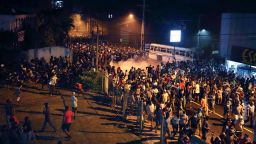A string of cabinet ministers and the central bank governor have resigned in Sri Lanka, as protesters in the capital defy curfew orders amid the country’s worst economic crisis in decades.
The Minister of Justice and the Minister of Youth and Sports, who is also the President’s nephew, are among those either to have resigned or signaled their intention to do so.
The moves follow weeks of turmoil in which a foreign exchange crisis in the island nation has forced a currency devaluation and sent the cost of basic goods such as food, medicine, and fuel soaring. Long lines at supermarkets, gas stations and pharmacies have tested the public’s patience, as have hours-long power blackouts.
Public anger boiled over into violent protests in Colombo last week, with demonstrators hurling bricks and setting fires outside the residence of President Gotabaya Rajapaksa. In response, the government on Friday declared a state of emergency, imposing a curfew in parts of the city and blocking social media platforms nationwide.
Protests went ahead on Sunday, in defiance of the curfew, and continued into Monday, with videos across social media showing crowds in the capital.
On Monday, the governor of the Central Bank, Ajith Nivard Cabraal, became the latest major figure to submit his resignation, following a wave that started over the weekend.
On Sunday evening, Minister of Youth and Sports Namal Rajapaksa announced on Twitter that he had informed the presidential office of his resignation “with immediate effect.”
He said he hoped this would help the administration “establish stability,” and that he remained “committed to my voters, my party and the people of Hambantota,” where he is a lawmaker.
He also criticized an apparent social media blackout, saying he would “never condone” such a move and urging authorities to “reconsider”.
Education Minister Dinesh Gunawardena told local media late on Sunday that he and other ministers had “handed our letters of resignation to the prime minister.”
“The president and the prime minister will discuss and take relevant decisions,” he said, without clarifying how many ministers had offered to quit.
The Minister of Justice has also resigned, with several other cabinet ministers signaling their intention to follow suit.
President responds
In a statement released by the presidential media team on Monday, President Rajapaksa didn’t directly address the resignations, only urging all parties to “work together for the sake of all the citizens and future generations.”
“The current crisis is a result of several economic factors and global developments,” the statement read. “As one of the leading democratic countries in Asia, solutions should be found to this within a democratic framework.”
Currency reserves have slumped 70% in the past two years to $2.31 billion, Reuters reported. Sri Lanka has to repay about $4 billion in debt over the rest of this year, including a $1 billion international sovereign bond that matures in July.
Shops have been forced to close because they can’t run fridges, air conditioners or fans, and soldiers are stationed at gas stations to calm customers, who line up for hours in the searing heat to fill their tanks. Some people have even died waiting.
Demonstrators had protested peacefully for weeks, with some calling on the President to resign, before the protests turned violent last Thursday in an escalation of the crisis.
And the latest resignations are not the only sign that there could be worse to come for Sri Lanka. National consumer price inflation has almost tripled, from 6.2% in September to 17.5% in February, according to the country’s central bank.
Reuters contributed reporting.





